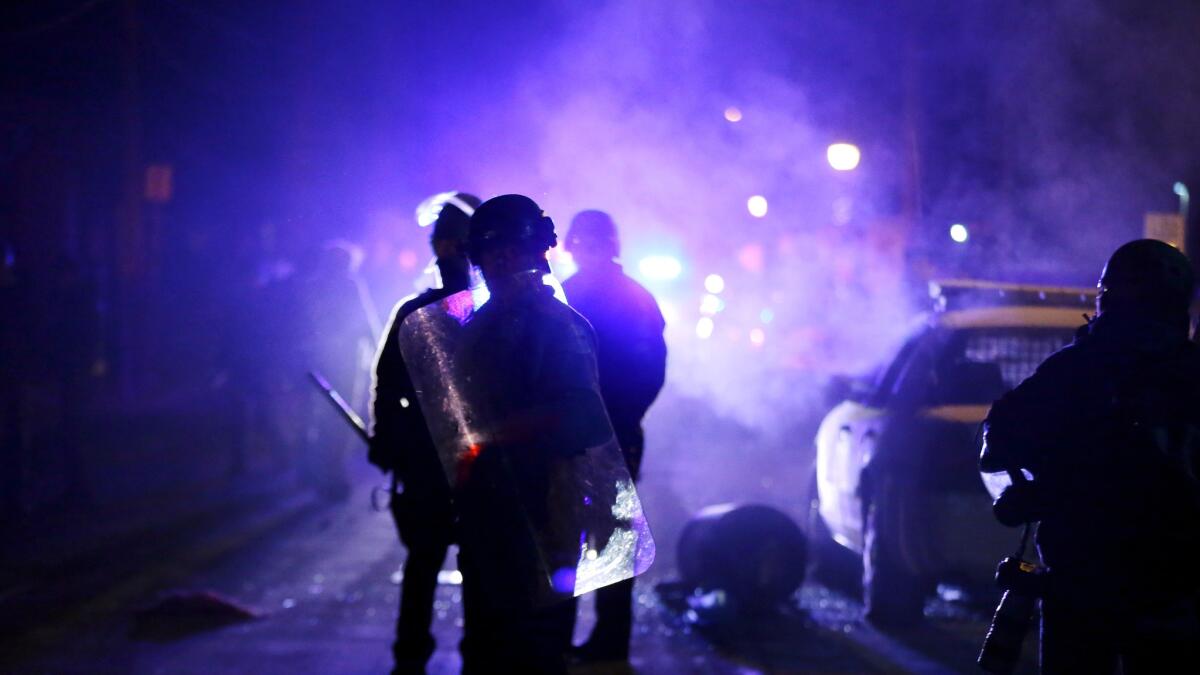Ferguson protester Darren Seals found shot dead in burning vehicle

Darren Seals, a black activist who protested in Ferguson, Mo., in 2014, was found shot to death in a burning vehicle in St. Louis County early Tuesday morning, according to county police.
Seals, 29, of St. Louis, was found at about 2 a.m. in the city of Riverview, one of dozens of small communities that make up St. Louis’ predominantly black northern suburbs. He had been shot one time. Police said his first name was spelled Daren, though court records and other activists spell his name as Darren.
No suspects have been arrested or identified, and police have not suggested a motive.
Some activists were chilled by the resemblance of Seals’ death to the unsolved killing of Deandre Joshua in Ferguson two years ago.
Joshua, 20, was also found shot dead in a burning vehicle on the night that St. Louis County Prosecutor Bob McCulloch announced that a grand jury had declined to indict Officer Darren Wilson for shooting unarmed 18-year-old Michael Brown.
“At this time the two homicides are not linked,” St. Louis County police spokesman Shawn McGuire said in an email. He declined to release more details on the manner of Seals’ death, citing the ongoing investigation.
NEWSLETTER: Get the day's top headlines from Times Editor Davan Maharaj »
At least four other St. Louis-area men have been found shot dead in burning cars in recent years, though it’s unclear if any of those cases were linked in any way. McGuire said such cases were unusual, and St. Louis city police did not immediately respond to a request for comment.
Seals, who also went by the name King D. Seals, was mourned by other activists who took part in the Ferguson protests, which began when Wilson, who is white, shot Brown, who was black, after a struggle.
“No matter what, @KingDSeals stood for STL & Mike Brown and was a part of my Ferguson family,” another protester, Ashley Yates, tweeted after news of Seals’ death spread. “Rest in power.”
In his Twitter profile, Seals described himself as a “Businessman, Revolutionary, Activist, Unapologetically BLACK, Afrikan in AmeriKKKa, Fighter, Leader.”
Seals was with Brown’s family on the night of the grand jury announcement, standing on top of a car outside the Ferguson Police Department. Seals later recalled Brown’s mother crying in his arms after the decision not to indict was announced.
“I’ve seen people crying, but she was really hurt. And it hurt me. It hurt all of us,” Seals wrote in an essay for MTV News.
Seals was proud of the protests he had joined. “I don’t recall anyone having a longer protest, a more productive protest, a more creative protest than what we did,” he wrote.
Seals added that violence was a fact of life where he lived in the St. Louis area.
“It’s easy to kill black people because we’re the have-nots,” Seals wrote. “What people don’t understand is, we actually live in a nightmare. We actually live in a place where gunshots [are normal]. We hear gunshots everyday.”
Seals was a contentious figure among the activists who gathered in Ferguson in 2014, some of whom he publicly accused of trying to “hijack” the protests. In July, he tweeted screenshots showing that several of Ferguson’s protesters had blocked him on Twitter.
But activists seemed to put any conflict aside in mourning his death, including DeRay Mckesson, who had been one of the most prominent targets of Seals’ criticism — and whom Seals claimed to have slapped at a protest in 2015.
“We can live in a world where people don't die by violence,” tweeted Mckesson, one of the most well-known figures to emerge from the protests in Ferguson, who would later mount an unsuccessful bid to be mayor of Baltimore. “Nobody deserves to die. We did not always agree, but he should be alive today.”
St. Louis rapper Tef Poe tweeted that he had last spoken to Seals two weeks ago, but was busy and forgot to call him back. He said he cried after he found out Seals was dead Tuesday morning.
“He loved the city and he loved the fact that we accomplished something no else had done in this lifetime,” Poe wrote in a caption for an Instagram post that included Seals posing for a photo with prominent black intellectual Cornel West, who came to Ferguson to protest.
“He was a controversial figure so some people might shy away from shouting him out. Not Me. When it was go time he was always there. Nobody can take that from him,” Poe wrote.
“Damn D.Seals a wild boy for life but he really believed in Saint Louis. I'm still in disbelief.”
ALSO
After months behind bars, the face of the armed Oregon occupation goes on trial
D.A. seeks to have 13 women testify against Bill Cosby in courtroom showdown
Chicago sees its 500th homicide of the year
UPDATES:
1:55 p.m.: This article has been updated throughout.
The first version of this article was published at 11:05 a.m.
Start your day right
Sign up for Essential California for news, features and recommendations from the L.A. Times and beyond in your inbox six days a week.
You may occasionally receive promotional content from the Los Angeles Times.




